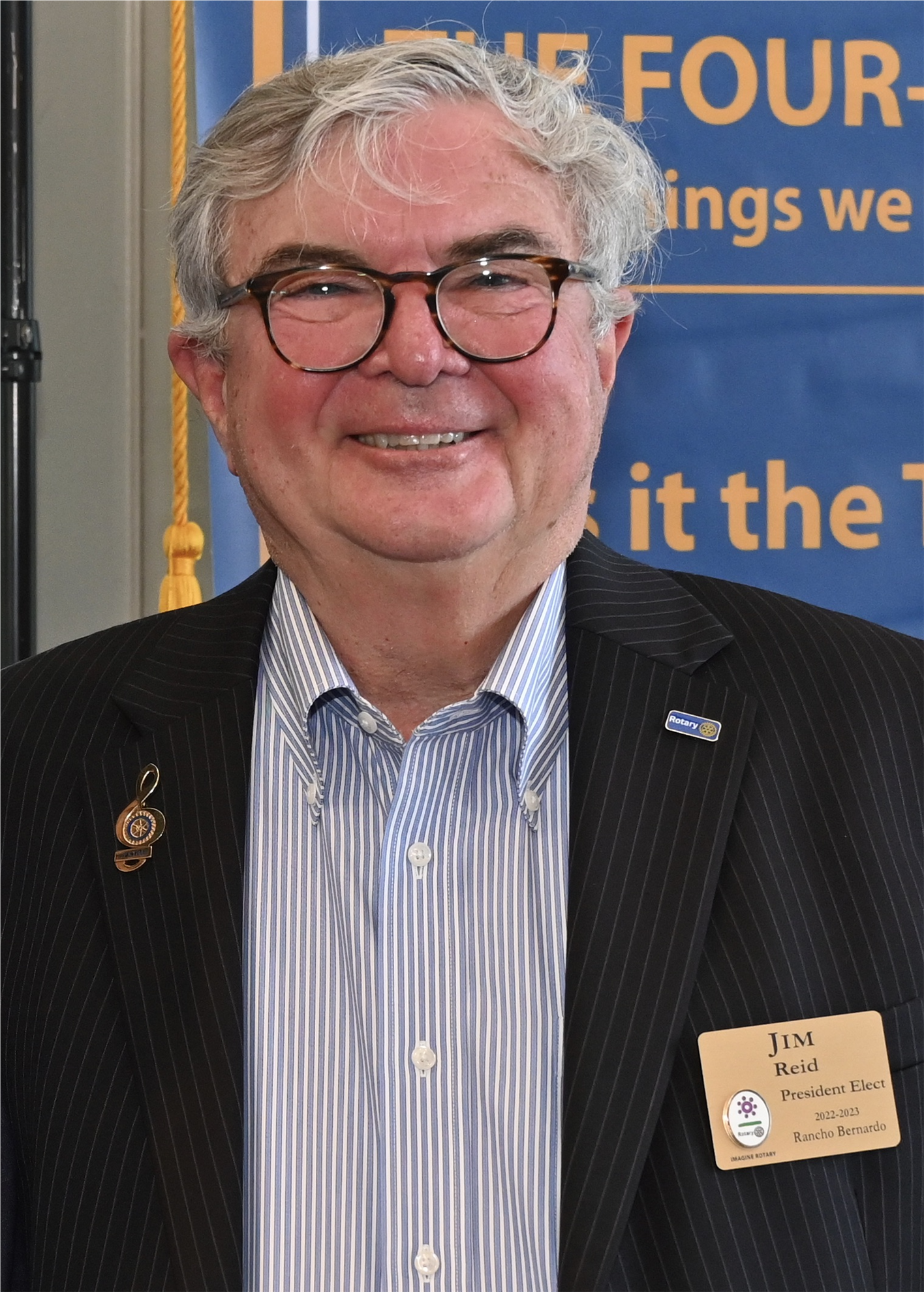Welcome to the Rancho Bernardo Rotary Club!
2023-24 President Jim Reid
People become Rotarians for all kinds of reasons. But the overwhelming reason they stay is that Rotary makes a difference in their lives and their impact in the world. Not only do Rotarians have a great time at meetings, hear inspiring speakers, and make lifelong friendships, but our friendships become deep and our connections to the community stronger, desiring to have mixes of cultures, religions, and backgrounds while such as political and religious discussions are not tolerated. We gain skills that help us in jobs, in dealing with other people, and give us the confidence to explore areas of service we never imagined.
The Rotary Club of Rancho Bernardo has several hallmarks. One of the most important is our commitment to youth, all COVID-19 considering. Our youth activities include college scholarships, Rotary programs such as Model UN, Four-Way Speech Contest, Rotary Youth Leadership Award camp, Interact Club at Del Norte High School and Rancho Bernardo High School, symphony training for international and local students at MusicCamp, and support for the Miss Rancho Bernardo programs. We distribute dictionaries and thesauri to third graders in several Poway Unified schools, and books to the Bernardo Heights Middle School library.
Our extensive community activities span far and wide. These include: serving meals at Ronald McDonald House, adopting Families in December, Veterans Village Stand Down in July, collecting/serving food for Interfaith Community Services, granting AAUW Tech Trek Scholarships for 8th grade students, distributing food for Friends of Vista Hill, donating to Gently Hugged, aiding the Tender Loving Canine service dog program, and many others. See our related website Rancho Bernardo Rotary Foundation, for other organizations our members support.
Our Club’s International programs have expanded this year. We facilitate donations to the Kumiai Nation in Northern Mexico through a fellow Rotary club in Tijuana. We contribute handsomely to disaster relief efforts whenever tragedies like last year’s devastating fires occur. And, of course we heartily support Rotary International’s efforts to eradicate polio throughout the world. This project is the ultimate in serving humanity and will continue to be a priority until the job is done. Rotary partners with the Bill and Melinda Gates Foundation, the World Health Organization and others to ensure this goal becomes a reality.
The club was founded in 1964 and we're still going strong. Come and join us for a meeting to learn more about us. We meet for lunch every Thursday at 11:45 am at the Bernardo Heights Country Club in Rancho Bernardo. On the first Thursday of the month we switch to a 5:30 dinner meeting at the same location. We hope you will join us for a meal. We hope you will join us for fun, action planning and interesting speakers.
Contact Membership Co-Chairs
for more information

What is the purpose of Rotary?
Rotary clubs exist to improve communities through a range of humanitarian, intercultural and educational activities. Clubs advance international understanding by partnering with clubs in other countries. Rotary also encourages high ethical standards in all vocations.
What do Rotary clubs do?
Rotary clubs address critical issues at home and abroad by providing health care and medical supplies, clean water, food, job training, youth development, and education to millions of people in need. Examples of Rotary’s focus areas include:
PROMOTING PEACE
Today, 42 million people are displaced by armed conflict or persecution. Through our partnerships with several leading universities, Rotary Peace Fellows develop the skills to strengthen peace efforts, train local leaders to prevent and mediate conflict, and support long-term peace building in areas affected by conflict. We provide up to 100 peace fellowships per year at Rotary Peace Centers.
FIGHTING DISEASE
More than 100 million people are pushed into poverty each year because of medical costs. We aim to improve and expand access to low-cost and free health care in underdeveloped areas. Our members educate and mobilize communities to help prevent the spread of major diseases such as polio, HIV/AIDS, and malaria. Many of our projects ensure that medical training facilities are located where the workforce lives.
PROVIDING CLEAN WATER
More than 2.5 million people lack access to adequate sanitation facilities. At least 3,000 children die each day from diarrheal diseases caused by unsafe water. Our projects give communities the ability to develop and maintain sustainable water and sanitation systems and support studies related to water and sanitation.
SAVING MOTHERS AND CHILDREN
At least 7 million children under the age of five die each year due to malnutrition, poor health care, and inadequate sanitation. To help reduce this rate, we provide immunizations and antibiotics to babies, improve access to essential medical services, and support trained health care providers for mothers and their children. Our projects ensure sustainability by empowering the local community to take ownership of health care training programs.
SUPPORTING EDUCATION
Sixty-seven million children worldwide have no access to education and more than 775 million people over the age of 15 are illiterate. Our goal is to strengthen the capacity of communities to support basic education and literacy, reduce gender disparity in education, and increase adult literacy.
GROWING LOCAL ECONOMIES
Nearly 1.4 billion employed people live on less than $1.25 a day. We carry out service projects that enhance economic and community development and develop opportunities for decent and productive work for young and old. We also help strengthen local entrepreneurs and community leaders, particularly women, in impoverished communities.


.png)












